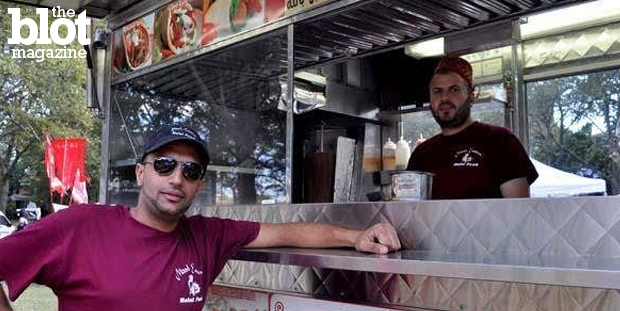
When it’s hot, you’re hungry, and you’re thirsty, fasting for Ramadan can be tough. But if you’re cooking and serving delicious food all day in a boiling food truck knowing you can’t have a morsel to eat or a sip to drink, it can be tougher. For the past month, scores of halal food truck workers prepared their dishes but, at least in daylight hours, they could dish it, but couldn’t take it.
After starting the month of fasting on June 17, Ramadan is slated to end on the evening of July 16, though it could last one more day and is contingent upon the lunar cycle.
“It’s almost over,” Mehdi Hassni of 3 Pyramids Halal Food in Bay Ridge, Brooklyn told TheBlot Magazine. “I’m definitely feeling it. Some people can’t fast it, and it can be hard.”
The 28-year-old from Morocco, who now lives in Bay Ridge, served chicken over rice to a customer and then explained his strategy.
“If I had an office job, it would be easier to fast, but I don’t have an office job,” he said. “Mentally, you have to get used to it and put it out of your mind. If you keep thinking about fasting, it’s not good for you.”
Across the street on 86th and 5th Avenue, Islam Ahmed, 21, served customers at Middle Eastern Halal Food. He recalled how students would playfully tease him when he was a student at Brooklyn’s John Dewey High School. He said that over the years, he got used to fasting. “In school, kids who were eating a cookie would say, ‘Don’t you want one? Don’t you wish you had one?’ It’s about willpower. You can’t spend the whole day focusing on what you are going to eat at 8:30,” he explained.
As he served a chicken gyro and lamb over rice, Ahmed said that fasting was hard, but not as hard as people think. “I really believe that anybody could do it,” he said. “People say it’s difficult, and it is, but like anything, you can get used to it. You have to have faith and look at it as a diet that you can’t break.
He said he didn’t lose any weight over Ramadan because he ate a lot during evenings and might be a little lazy. He said he has one regret as Ramadan ends and the holiday of Eid al-Fitr, which is also known as the Feast of Breaking the Fast, begins. “You’re supposed to have a home-cooked meal, but my mom is out of the country, so I’m going to probably get something at a restaurant.”
Read more: Can A Little Fasting Make You An Immortal Genius?
In front of the Barclays Center in Brooklyn, Ahmed Ramadan pushed pieces of chicken on the grill. The 26-year-old originally from Egypt said fasting helps you. “It’s good for your body,” he said. “It needs a rest from eating all the time.”
But as sweat dripped from his head, he admitted that there was a great challenge.
“You can get used to not eating,” Ramadan said. “But it gets very hot inside the truck here. You can’t get used to not drinking water.”
On 96th Street and Broadway on Manhattan’s Upper West Side, Kareem Nafal served lamb over rice at Basmala Halal Food. The 23-year-old Queens resident said the heat was tough and working long hours without eating the food he serves was tiring. He said he was excited to break the fast tonight.
“My kitchen at home is ready,” he shared.
Abdul Mateen, 38, admits it would be harder to fast if he worked on a food truck, but it was still tough as he runs H&M News on 100th Street and Broadway on the Upper West Side and is surrounded by food and drinks. He said he eats oatmeal before the sun rises because it is filling, but it also dries you out and leaves you thirsty. He said his friends eat watermelon in the morning because it has a high water content and their body can store the water.
“If you have the resistance to the temptation, it doesn’t really matter,” said Mateen, who lives in Queens and is originally from India. “The faith gives you the power for resistance, and God said to fast for 30 days if you are physically fit so that you can realize the hunger in the world. I could go under the counter and drink a sip of water and nobody would know. But God would know. You have to learn to resist your urges.”
Alan Zeitlin is a contributing journalist for TheBlot Magazine.





